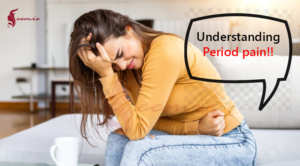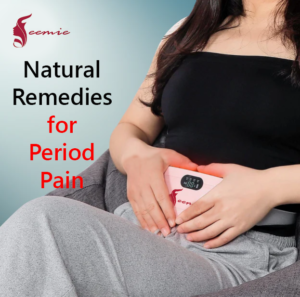
- Home
- Blog
- Natural remedies for period pain
Managing Period Pain at Work or School
For many women, the monthly arrival of menstruation brings with it the unwelcome companion of period pain. While over-the-counter medications can offer relief, some may prefer natural remedies that address the root causes of discomfort. In this blog post, we explore a range of natural approaches to alleviate period pain, including dietary changes, herbal remedies, and lifestyle adjustments.
Dietary Changes:
- Anti-inflammatory Foods: Incorporating anti-inflammatory foods such as fatty fish (rich in omega-3 fatty acids), fruits, vegetables, nuts, and whole grains into your diet may help reduce inflammation and alleviate period pain.
- Magnesium-Rich Foods: Magnesium has been shown to help relax muscles and reduce cramping. Foods high in magnesium include leafy greens, nuts, seeds, and legumes.
- Limiting Certain Foods: Avoiding or reducing intake of caffeine, alcohol, sugary foods, and processed foods may help minimize inflammation and alleviate bloating and discomfort.
- Anti-inflammatory Foods: Incorporating anti-inflammatory foods such as fatty fish (rich in omega-3 fatty acids), fruits, vegetables, nuts, and whole grains into your diet may help reduce inflammation and alleviate period pain.
- Magnesium-Rich Foods: Magnesium has been shown to help relax muscles and reduce cramping. Foods high in magnesium include leafy greens, nuts, seeds, and legumes.
- Limiting Certain Foods: Avoiding or reducing intake of caffeine, alcohol, sugary foods, and processed foods may help minimize inflammation and alleviate bloating and discomfort.
- Anti-inflammatory Foods: Incorporating anti-inflammatory foods such as fatty fish (rich in omega-3 fatty acids), fruits, vegetables, nuts, and whole grains into your diet may help reduce inflammation and alleviate period pain.
- Magnesium-Rich Foods: Magnesium has been shown to help relax muscles and reduce cramping. Foods high in magnesium include leafy greens, nuts, seeds, and legumes.
- Limiting Certain Foods: Avoiding or reducing intake of caffeine, alcohol, sugary foods, and processed foods may help minimize inflammation and alleviate bloating and discomfort.
- Anti-inflammatory Foods: Incorporating anti-inflammatory foods such as fatty fish (rich in omega-3 fatty acids), fruits, vegetables, nuts, and whole grains into your diet may help reduce inflammation and alleviate period pain.
- Magnesium-Rich Foods: Magnesium has been shown to help relax muscles and reduce cramping. Foods high in magnesium include leafy greens, nuts, seeds, and legumes.
- Limiting Certain Foods: Avoiding or reducing intake of caffeine, alcohol, sugary foods, and processed foods may help minimize inflammation and alleviate bloating and discomfort.
Herbal Remedies:
- Ginger: Ginger has natural anti-inflammatory properties and may help relieve menstrual cramps. Enjoy ginger tea or add fresh ginger to your meals.
- Chamomile: Chamomile tea is known for its calming effects and may help reduce muscle spasms and ease period pain.
- Peppermint: Peppermint tea or oil may help relax muscles and alleviate digestive discomfort associated with menstruation.
- Lifestyle Adjustments:
- Regular Exercise: Engaging in regular physical activity, such as walking, yoga, or swimming, can help reduce period pain by promoting blood circulation and releasing endorphins, the body’s natural pain relievers.
- Stress Management Techniques: Stress can exacerbate period pain, so practicing stress-reduction techniques such as deep breathing, meditation, or mindfulness can be beneficial.
- Heat Therapy: Applying heat to the lower abdomen or lower back can help relax muscles and alleviate cramps. Use a heating pad, hot water bottle, or take a warm bath to soothe discomfort.
- Adequate Sleep: Prioritize quality sleep during your menstrual cycle, as insufficient sleep can worsen pain perception and hormonal imbalances.
Conclusion
While period pain is a common experience for many women, it doesn’t have to be debilitating. By incorporating natural remedies into your routine, such as dietary changes, herbal remedies, and lifestyle adjustments, you can help alleviate discomfort and promote overall well-being during menstruation. Remember to listen to your body, experiment with different approaches, and seek professional advice if needed. With a holistic approach to menstrual health, you can find relief and reclaim your vitality each month.



